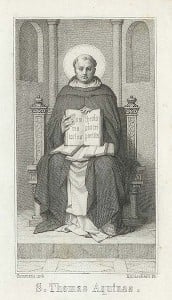 We’re blogging through St. Thomas Aquinas’ Compendium Theologiae, sometimes called his Shorter Summa. Find the previous posts here.
We’re blogging through St. Thomas Aquinas’ Compendium Theologiae, sometimes called his Shorter Summa. Find the previous posts here.
Having explained just how the Word, the Second Person of the Trinity, is generated from the Father from all eternity, Thomas goes on to explain that, in John the Evangelist’s words, “the Word was God.”
Since natural existence and the action of understanding are distinct in us, we should note that a word conceived in our intellect, having only intellectual existence, differs in nature from our intellect, which has natural existence. In God, however, to be and to understand are identical.
By now, this should be a familiar move. Intellectual conception in God is analogous to conception in us, but we are compositions of many parts, whereas God is metaphysically one and simple: in God all is God. His intellect is His will is His existence is His essence.
Therefore the divine Word that is in God, whose Word He is according to intellectual existence, has the same existence as God, whose Word He is. Consequently the Word must be of the same essence and nature as God Himself, and all attributes whatsoever that are predicated of God, must pertain also to the Word of God.
And so the Word of God is God: the Son and the Father are one.
____
photo credit: Public Domain; source Wikimedia Commons









